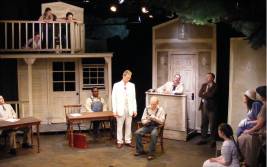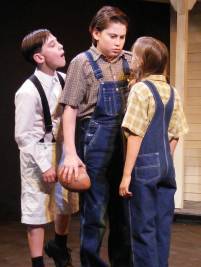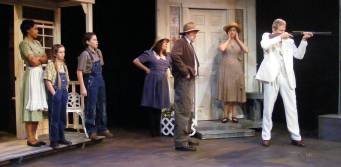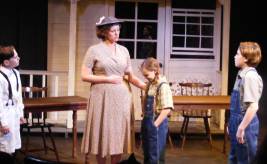
If adapting a novel for the stage provides a writing challenge for any playwright, imagine how daunting the task becomes when the novel in question has been voted the “Best Novel Of The 20th Century.”* Christopher Sergel took on this challenge in his 1990 stage adaptation of Harper Lee’s beloved Pulitzer Prize winner To Kill A Mockingbird, and though the resulting script does not rise to the level of its source material, its latest revival reestablishes The Production Company’s standing as one of L.A.’s finest and provides two hours of edifying, thought-provoking, beautifully acted, and ultimately inspiring theater.
Lee’s semi-autobiographical novel centers on 10-year-old tomboy Jean Louise Finch, aka Scout, and her coming of age in small town Alabama during the Great Depression. It is through Scout’s eyes (as both the child she was and the adult she has become) that Lee is able to explore themes of racial injustice, social class, gender roles, courage, and compassion in what in lesser hands might have been just another young adult novel.
In episodic fashion, Lee shows us various snapshots of Scout’s life with older brother Jem, visiting childhood friend Dill (inspired by Lee’s real life friend Truman Capote), housekeeper Calpurnia, and above all her 50-year-old self-educated lawyer father Atticus Finch (played most memorably by Gregory Peck in the 1962 film adaptation). We also meet her neighbors, among them warmhearted Maudie Atkinson, crabby old Mrs. Dubose, and gossipy Stephanie Crawford. Little by little, Scout’s narrative introduces the plot thread around which the second half of the novel revolves—the rape trial of 25-year-old “Negro” Tom Robinson and his poor white trash accusers Mayella Ewell and her good-for-nothing father Bob. It is from this trial that narrator Scout reveals the racism so pervasive in post-Civil War South and discovers the heroism of her progressive-minded father, an upright man who saw beyond the hatred and ignorance surrounding them.
Fans of Horton Foote’s Oscar-winning screenplay will probably be disappointed by playwright Sergel’s decision to have it narrated by Miss Maudie, rather than through the eyes and voice of the woman Scout went on to become. Having a character break the fourth wall, as Maudie does quite frequently, is risky business, and here at least it proves considerably less effective than had Sergel let the 1960s Scout narrate her own story and kept Maudie Atkinson the supporting player Lee intended her to be. Also, Sergel’s Cliff Notes-style stage adaptation squeezes a dozen or more conversations and events (which in the novel take place over the course of several years) into several days of a single summer—and about forty minutes stage time. While the playwright uses Lee’s exact words, the effect of so much talk and so much plot in so little time proves a bit too much.
Still, script quibbles aside, with performances as fine as those onstage at The ProdCo’s new and considerably larger home at the Lex, skilled direction by T.L. Kolman, and a first-rate production design, there are ample reasons not to miss To Kill A Mockingbird, Harper Lee’s message of racial tolerance remaining as powerful as ever. Once Tom’s trial is underway, Sergel’s play takes flight, the entire second act making for the gripping, suspenseful, emotionally wrenching experience we have been expecting, and end up rewarded by.
As Atticus, a subtly brilliant James Horan pays tribute to Gregory Peck’s unforgettable film work while adding personal touches that make the part his own. Three terrific child actors (Brighid Fleming, L.J. Benet, and Patrick Fitzsimmons) bring Scout, Jem, and Dill to vivid, authentic life. A lovely Ferrell Marshall imbues Maudie with warmth and wisdom. Inda Craig-Galván makes the very most of Finch family maid Calpurnia’s every moment, though this major character in Lee’s novel is sadly given little stage time in Sergel’s adaptation. Jim Hanna is a splendid, folksy Heck Tate, and Barbara Gruen a dry delight in the dual roles of Miss Stephanie and Mrs. Dubose. David Stifel does fine work as Mr. Cunningham and (particularly) as Judge Taylor and an excellent Christopher Carver demonstrates versatility as racist prosecutor Gilmer and the mysterious, heroic Boo Radley. The always impressive Skip Pipo shows us the ugliness of racial hatred and ignorance as Bob Ewing and Margaret Dwyer dazzles in her emotional interrogation scene as self-proclaimed rape victim Mayella. Finally, Lorenzo T. Hughes gives falsely accused rapist Tom Robinson great dignity and strength under fire, and doubles effectively as Reverend Sykes.
Scenic designer August Viverito takes advantage of the extra space the wider, deeper Lex stage affords him by creating a Finch neighborhood that would have been impossible in The ProdCo’s previous home. Viverito’s inventive set transforms quickly and effectively from outdoors to dual-level courtroom, though a house which doubles as both Miss Maudie’s and Mrs. Debose’s does provide some initial confusion. Lighting designer Ric Zimmerman once again does impeccable work, focusing audience attention and enhancing emotions. Viverito’s costume design evokes the Depression era South. Only Miss Stephanie’s contemporary hairdo and Judge Taylor’s ponytail prove anachronistic distractions.
To Kill A Mockingbird is produced by Viverito and Kolman. Renee Scott and Dawn Meyer are stage managers.
Even today, over a half century since its publication, To Kill A Mockingbird remains one of the true classics of 20th Century American literature, possessing the rare quality of being accessible and relevant to readers as young as Scout and as old as Mrs. DuBose. As a history lesson, it shows us how bad things were as well and reminds us of the progress we have made and the work that still needs to be done. Though Sergel’s adaptation may not be all that we wish it were, there are countless reasons to catch this The ProdCo production, not the least of which is the inspiration it may provide to reread Harper Lee’s To Kill A Mockingbird, or to discover it for the first time.
*In 1999, by the readers of Library Journal
The Production Company at the Lex Theatre, 6760 Lexington Avenue, Hollywood.
www.theprodco.com
–Steven Stanley
January 14, 2011
Photos: The Production Company






 Since 2007, Steven Stanley's StageSceneLA.com has spotlighted the best in Southern California theater via reviews, interviews, and its annual StageSceneLA Scenies.
Since 2007, Steven Stanley's StageSceneLA.com has spotlighted the best in Southern California theater via reviews, interviews, and its annual StageSceneLA Scenies.







 COPYRIGHT 2024 STEVEN STANLEY :: DESIGN BY
COPYRIGHT 2024 STEVEN STANLEY :: DESIGN BY